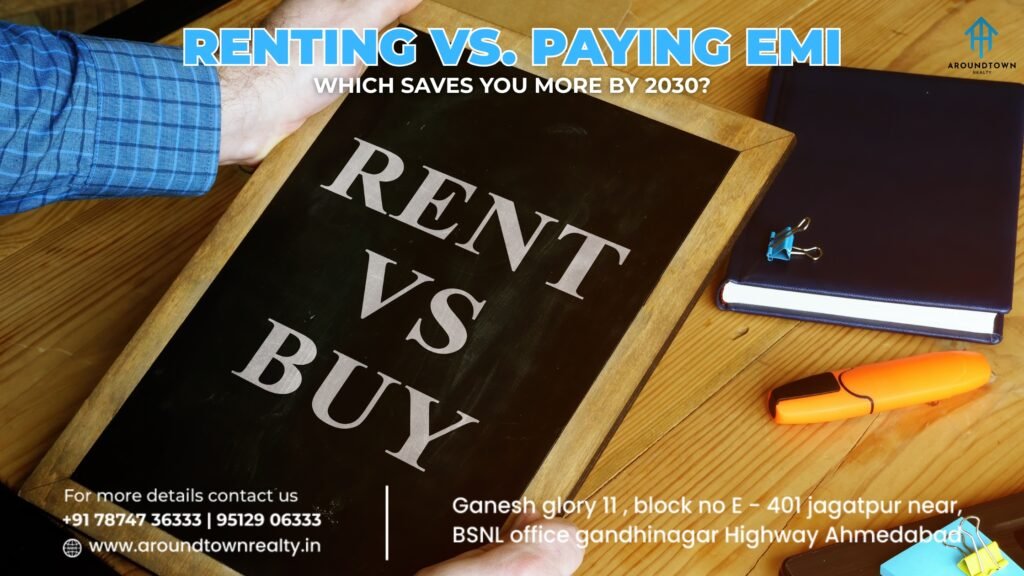As urban India continues to expand and real estate prices fluctuate, one fundamental question keeps haunting millennials and Gen Z professionals—Should you continue renting or start paying EMIs to own a home? It’s not just a financial question; it’s a lifestyle decision that directly impacts your flexibility, wealth-building strategy, tax liability, and overall peace of mind.
With 2030 on the horizon and major economic shifts underway—rising interest rates, changing work cultures, urban migration patterns, and increasing property prices—this debate is more relevant than ever. In this blog, we break down the long-term cost, value, and lifestyle implications of Renting or Paying EMIs so you can make an informed choice that suits your financial goals and personal priorities.
1. Understanding the Cost Difference: Rent vs. EMI Over Time
Renting: The Short-Term Win
Renting a house gives you the flexibility of moving locations, changing homes based on lifestyle or job changes, and avoiding large down payments or maintenance costs. You pay a monthly rent that increases around 5-10% every 11 months, depending on market conditions.
- Example: If you’re renting a 2BHK in Ahmedabad for ₹20,000/month, by 2030 that rent could rise to ₹30,000–₹35,000/month.
- You avoid property tax, interest payments, and upfront investment.
- However, all rent paid is an expense. It does not build any asset for you.
EMIs: Asset-Building with a Catch
Paying EMIs is essentially renting from the bank—with the upside that in 15–30 years, the property will be yours.
- Let’s say you buy a home worth ₹50 lakhs at 8.5% interest for 20 years.
- Your EMI would be around ₹43,000/month. Over 20 years, you would pay ~₹1.03 crore (principal + interest).
- Unlike rent, this cost goes toward building equity in your name. But the initial 5–10 years go primarily toward interest payments.
2. Down Payment vs. Security Deposit
Renting:
- Typically, you pay 2–6 months’ rent as a security deposit.
- Little to no paperwork beyond agreement registration.
- Refundable if there are no damages.
Buying:
- You must make a down payment of at least 10–20% of the property value.
- For a ₹50L home, that’s ₹5L–₹10L upfront—plus registration, stamp duty, and brokerage.
By 2030, if property prices continue to rise, down payments will become a bigger entry barrier—unless income growth keeps pace.
3. Tax Benefits: Who Gets the Advantage?
Renting:
- You can claim HRA (House Rent Allowance) deduction if you’re a salaried individual living in a rented house and receiving HRA.
- The deduction is based on salary, rent paid, and city type (metro or non-metro).
Paying EMI:
- You get Section 80C benefit: up to ₹1.5L per annum on principal repayment.
- Section 24(b) allows deduction of up to ₹2L per annum on home loan interest.
- Joint home loans can double these benefits if both owners are earning.
By 2030, if these benefits continue or expand, buying could give you more tax relief compared to just claiming HRA.
READ THIS FOR MORE, Tax Benefits of Buying a Property in Ahmedabad
4. Maintenance and Hidden Costs
Renting:
- Landlord bears major repair costs and property taxes.
- You might pay for minor wear-and-tear, but large expenses are not your responsibility.
- Flexibility to move out without being stuck in an underperforming locality.
Buying:
- As an owner, you are liable for:
- Annual property tax
- Repairs and renovations
- Maintenance fees (especially in gated societies)
- Insurance, if opted
Long term, these costs can add up. However, if property value appreciates, these expenses are offset by capital gains.
5. Appreciation and ROI Potential by 2030
Rent never appreciates—only property does. If you buy smartly in a growing area (like New GIFT City, Dwarka Expressway, or Outer Ring Roads in metros), your property can appreciate significantly by 2030.
- A ₹50L home in 2025 appreciating at 6% annually could be worth ₹67L+ by 2030.
- You can also earn passive income by renting it out—making EMI a long-term wealth creation tool.
In contrast, renting for 10 years yields zero return—although it saves you from market risks and liquidity challenges.
6. Lifestyle and Flexibility: The Intangibles
Renting Wins If:
- You want flexibility to change jobs or cities frequently.
- You’re unsure about settling down or committing to a location.
- You want to avoid the burden of long-term debt.
Owning Wins If:
- You want stability, security, and control over your space.
- You view your home as a long-term investment and identity.
- You’re ready to manage property-related obligations.
By 2030, remote work and hybrid models could change how Indians choose homes—making flexibility a stronger reason for some to keep renting.
7. Inflation Hedge: Where Ownership Scores
Homeownership protects you from rising rental inflation. What you lock in today becomes your financial shield in the future.
- EMIs are fixed (unless you opt for floating interest rates).
- Rent is variable and generally increases 5–8% annually.
- Over a decade, cumulative rent can often exceed the initial cost of the house—without leaving you with an asset.
For someone looking at a long-term financial horizon, ownership is a strategic inflation hedge.
8. Real Estate Market Trends by 2030: What to Expect
- Tier-2 and Tier-3 cities will attract more first-time buyers as they offer affordability and infrastructure growth.
- EV-ready homes, smart security, and green features will dominate new launches, adding value to owned homes.
- Rental housing models like co-living and managed rentals will evolve, offering premium experiences without ownership hassles.
Your decision in 2025 will determine whether you ride the appreciation wave or stay flexible and liquid in a rapidly changing market.
Conclusion: Which Saves You More by 2030?
There is no one-size-fits-all answer. It depends on your income, financial goals, city, life plans, and risk appetite.
- If you are financially stable, clear about your city choice, and planning long-term, buying a home on EMI is an asset-building move with high ROI potential by 2030.
- If you are early in your career, value flexibility, or unsure about location stability, renting makes more sense—and gives you the freedom to invest elsewhere.
Still Confused Between Renting or Buying?
Let AroundTown Realty (ATR) help you compare both paths with real-time numbers, builder reviews, and future price predictions in your city. Whether you’re looking to lock in your first property or want to invest in an area poised for growth by 2030, we’ll simplify every step.
Connect with ATR today to make your real estate journey smarter, strategic, and future-ready.
FAQs
1.What is the main difference between renting and paying EMI for a home?
Renting involves paying a monthly amount to a landlord for using the property, whereas paying EMI is a loan repayment for owning a property. With EMI, you eventually own the home, while renting provides flexibility but no ownership.
2.Is renting more affordable than paying EMI?
Renting is usually more affordable in the short term, as it requires lower monthly payments compared to an EMI. However, over time, the cost of renting may exceed the cost of owning, especially if property prices increase and rents go up.
3.Which option offers better long-term financial benefits: renting or paying EMI?
Paying EMI can offer better long-term financial benefits because, with each payment, you build equity in the property. In contrast, rent payments provide no return on investment and do not contribute to ownership.
4.Does paying EMI offer tax benefits compared to renting?
Yes, paying EMI offers certain tax benefits, such as deductions on the principal and interest paid under Section 80C and Section 24(b) of the Income Tax Act. Renters, on the other hand, can claim House Rent Allowance (HRA) but do not receive deductions for home loan repayments.
5.What should I consider when deciding between renting and paying EMI by 2030?
Factors like financial stability, future plans (such as relocation or job changes), property market trends, and the total cost of ownership should be considered. If you’re planning to stay in one place long-term, paying EMI may be more beneficial, while renting provides flexibility and fewer responsibilities.









